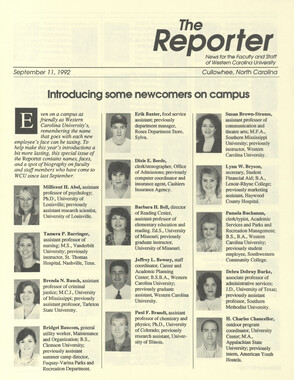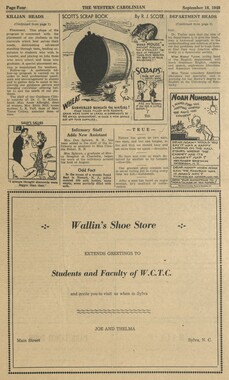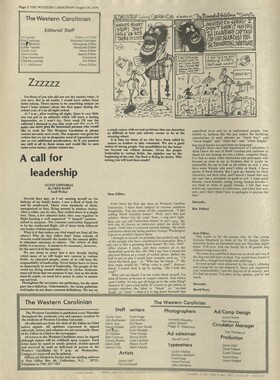Western Carolina University (20)
View all
- Canton Champion Fibre Company (2308)
- Cherokee Traditions (291)
- Civil War in Southern Appalachia (165)
- Craft Revival (1942)
- Great Smoky Mountains - A Park for America (2946)
- Highlights from Western Carolina University (430)
- Horace Kephart (941)
- Journeys Through Jackson (159)
- LGBTQIA+ Archive of Jackson County (85)
- Oral Histories of Western North Carolina (314)
- Picturing Appalachia (6873)
- Stories of Mountain Folk (413)
- Travel Western North Carolina (160)
- Western Carolina University Fine Art Museum Vitreograph Collection (129)
- Western Carolina University Herbarium (92)
- Western Carolina University: Making Memories (738)
- Western Carolina University Publications (2488)
- Western Carolina University Restricted Electronic Theses and Dissertations (146)
- Western North Carolina Regional Maps (71)
- World War II in Southern Appalachia (131)
University of North Carolina Asheville (6)
View all
- Western Carolina College (199)
- Western Carolina Teachers College (239)
- Western Carolina University (1973)
- Allanstand Cottage Industries (0)
- Appalachian National Park Association (0)
- Bennett, Kelly, 1890-1974 (0)
- Berry, Walter (0)
- Brasstown Carvers (0)
- Cain, Doreyl Ammons (0)
- Carver, George Washington, 1864?-1943 (0)
- Cathey, Joseph, 1803-1874 (0)
- Champion Fibre Company (0)
- Champion Paper and Fibre Company (0)
- Cherokee Indian Fair Association (0)
- Cherokee Language Program (0)
- Crittenden, Lorraine (0)
- Crowe, Amanda (0)
- Edmonston, Thomas Benton, 1842-1907 (0)
- Ensley, A. L. (Abraham Lincoln), 1865-1948 (0)
- Fromer, Irving Rhodes, 1913-1994 (0)
- George Butz (BFS 1907) (0)
- Goodrich, Frances Louisa (0)
- Grant, George Alexander, 1891-1964 (0)
- Heard, Marian Gladys (0)
- Kephart, Calvin, 1883-1969 (0)
- Kephart, Horace, 1862-1931 (0)
- Kephart, Laura, 1862-1954 (0)
- Laney, Gideon Thomas, 1889-1976 (0)
- Masa, George, 1881-1933 (0)
- McElhinney, William Julian, 1896-1953 (0)
- Niggli, Josephina, 1910-1983 (0)
- North Carolina Park Commission (0)
- Osborne, Kezia Stradley (0)
- Owens, Samuel Robert, 1918-1995 (0)
- Penland Weavers and Potters (0)
- Rhodes, Judy (0)
- Roberts, Vivienne (0)
- Roth, Albert, 1890-1974 (0)
- Schenck, Carl Alwin, 1868-1955 (0)
- Sherrill's Photography Studio (0)
- Smith, Edward Clark (0)
- Southern Highland Handicraft Guild (0)
- Southern Highlanders, Inc. (0)
- Stalcup, Jesse Bryson (0)
- Stearns, I. K. (0)
- Thompson, James Edward, 1880-1976 (0)
- United States. Indian Arts and Crafts Board (0)
- USFS (0)
- Vance, Zebulon Baird, 1830-1894 (0)
- Weaver, Zebulon, 1872-1948 (0)
- Western Carolina University. Mountain Heritage Center (0)
- Whitman, Walt, 1819-1892 (0)
- Wilburn, Hiram Coleman, 1880-1967 (0)
- Williams, Isadora (0)
- 1920s (57)
- 1930s (69)
- 1940s (114)
- 1950s (66)
- 1960s (314)
- 1970s (599)
- 1980s (406)
- 1990s (379)
- 2000s (282)
- 2010s (175)
- 1600s (0)
- 1700s (0)
- 1800s (0)
- 1810s (0)
- 1820s (0)
- 1830s (0)
- 1840s (0)
- 1850s (0)
- 1860s (0)
- 1870s (0)
- 1880s (0)
- 1890s (0)
- 1900s (0)
- 1910s (0)
- 2020s (0)
- Jackson County (N.C.) (2463)
- Appalachian Region, Southern (0)
- Asheville (N.C.) (0)
- Avery County (N.C.) (0)
- Blount County (Tenn.) (0)
- Buncombe County (N.C.) (0)
- Cherokee County (N.C.) (0)
- Clay County (N.C.) (0)
- Graham County (N.C.) (0)
- Great Smoky Mountains National Park (N.C. and Tenn.) (0)
- Haywood County (N.C.) (0)
- Henderson County (N.C.) (0)
- Knox County (Tenn.) (0)
- Knoxville (Tenn.) (0)
- Lake Santeetlah (N.C.) (0)
- Macon County (N.C.) (0)
- Madison County (N.C.) (0)
- McDowell County (N.C.) (0)
- Mitchell County (N.C.) (0)
- Polk County (N.C.) (0)
- Qualla Boundary (0)
- Rutherford County (N.C.) (0)
- Swain County (N.C.) (0)
- Transylvania County (N.C.) (0)
- Watauga County (N.C.) (0)
- Waynesville (N.C.) (0)
- Yancey County (N.C.) (0)
- Newsletters (510)
- Publications (documents) (1978)
- Aerial Photographs (0)
- Aerial Views (0)
- Albums (books) (0)
- Articles (0)
- Artifacts (object Genre) (0)
- Bibliographies (0)
- Biography (general Genre) (0)
- Cards (information Artifacts) (0)
- Clippings (information Artifacts) (0)
- Copybooks (instructional Materials) (0)
- Crafts (art Genres) (0)
- Depictions (visual Works) (0)
- Design Drawings (0)
- Drawings (visual Works) (0)
- Envelopes (0)
- Exhibitions (events) (0)
- Facsimiles (reproductions) (0)
- Fiction (general Genre) (0)
- Financial Records (0)
- Fliers (printed Matter) (0)
- Glass Plate Negatives (0)
- Guidebooks (0)
- Internegatives (0)
- Interviews (0)
- Land Surveys (0)
- Letters (correspondence) (0)
- Manuscripts (documents) (0)
- Maps (documents) (0)
- Memorandums (0)
- Minutes (administrative Records) (0)
- Negatives (photographs) (0)
- Newspapers (0)
- Notebooks (0)
- Occupation Currency (0)
- Paintings (visual Works) (0)
- Pen And Ink Drawings (0)
- Periodicals (0)
- Personal Narratives (0)
- Photographs (0)
- Plans (maps) (0)
- Poetry (0)
- Portraits (0)
- Postcards (0)
- Programs (documents) (0)
- Questionnaires (0)
- Relief Prints (0)
- Sayings (literary Genre) (0)
- Scrapbooks (0)
- Sheet Music (0)
- Slides (photographs) (0)
- Songs (musical Compositions) (0)
- Sound Recordings (0)
- Specimens (0)
- Speeches (documents) (0)
- Text Messages (0)
- Tintypes (photographs) (0)
- Transcripts (0)
- Video Recordings (physical Artifacts) (0)
- The Reporter, Western Carolina University (510)
- WCU Students Newspapers Collection (1920)
- A.L. Ensley Collection (0)
- Appalachian Industrial School Records (0)
- Appalachian National Park Association Records (0)
- Axley-Meroney Collection (0)
- Bayard Wootten Photograph Collection (0)
- Bethel Rural Community Organization Collection (0)
- Blumer Collection (0)
- C.W. Slagle Collection (0)
- Canton Area Historical Museum (0)
- Carlos C. Campbell Collection (0)
- Cataloochee History Project (0)
- Cherokee Studies Collection (0)
- Daisy Dame Photograph Album (0)
- Daniel Boone VI Collection (0)
- Doris Ulmann Photograph Collection (0)
- Elizabeth H. Lasley Collection (0)
- Elizabeth Woolworth Szold Fleharty Collection (0)
- Frank Fry Collection (0)
- George Masa Collection (0)
- Gideon Laney Collection (0)
- Hazel Scarborough Collection (0)
- Hiram C. Wilburn Papers (0)
- Historic Photographs Collection (0)
- Horace Kephart Collection (0)
- Humbard Collection (0)
- Hunter and Weaver Families Collection (0)
- I. D. Blumenthal Collection (0)
- Isadora Williams Collection (0)
- Jesse Bryson Stalcup Collection (0)
- Jim Thompson Collection (0)
- John B. Battle Collection (0)
- John C. Campbell Folk School Records (0)
- John Parris Collection (0)
- Judaculla Rock project (0)
- Kelly Bennett Collection (0)
- Love Family Papers (0)
- Major Wiley Parris Civil War Letters (0)
- Map Collection (0)
- McFee-Misemer Civil War Letters (0)
- Mountain Heritage Center Collection (0)
- Norburn - Robertson - Thomson Families Collection (0)
- Pauline Hood Collection (0)
- Pre-Guild Collection (0)
- Qualla Arts and Crafts Mutual Collection (0)
- R.A. Romanes Collection (0)
- Rosser H. Taylor Collection (0)
- Samuel Robert Owens Collection (0)
- Sara Madison Collection (0)
- Sherrill Studio Photo Collection (0)
- Smoky Mountains Hiking Club Collection (0)
- Stories of Mountain Folk - Radio Programs (0)
- Venoy and Elizabeth Reed Collection (0)
- WCU Gender and Sexuality Oral History Project (0)
- WCU Mountain Heritage Center Oral Histories (0)
- WCU Oral History Collection - Mountain People, Mountain Lives (0)
- Western North Carolina Tomorrow Black Oral History Project (0)
- William Williams Stringfield Collection (0)
- Zebulon Weaver Collection (0)
- College student newspapers and periodicals (1948)
- African Americans (0)
- Appalachian Trail (0)
- Artisans (0)
- Cherokee art (0)
- Cherokee artists -- North Carolina (0)
- Cherokee language (0)
- Cherokee pottery (0)
- Cherokee women (0)
- Church buildings (0)
- Civilian Conservation Corps (U.S.) (0)
- Dams (0)
- Dance (0)
- Education (0)
- Floods (0)
- Folk music (0)
- Forced removal, 1813-1903 (0)
- Forest conservation (0)
- Forests and forestry (0)
- Gender nonconformity (0)
- Great Smoky Mountains National Park (N.C. and Tenn.) (0)
- Hunting (0)
- Landscape photography (0)
- Logging (0)
- Maps (0)
- Mines and mineral resources (0)
- North Carolina -- Maps (0)
- Paper industry (0)
- Postcards (0)
- Pottery (0)
- Railroad trains (0)
- Rural electrification -- North Carolina, Western (0)
- School integration -- Southern States (0)
- Segregation -- North Carolina, Western (0)
- Slavery (0)
- Sports (0)
- Storytelling (0)
- Waterfalls -- Great Smoky Mountains (N.C. and Tenn.) (0)
- Weaving -- Appalachian Region, Southern (0)
- Wood-carving -- Appalachian Region, Southern (0)
- World War, 1939-1945 (0)
- Text (2488)
- MovingImage (0)
- Sound (0)
- StillImage (0)
Western Carolinian Volume 29 Number 15
Item
Item’s are ‘child’ level descriptions to ‘parent’ objects, (e.g. one page of a whole book).
-
-
FRIDAY, FEBRUARY 7, 1964 PAGE THREE Limelight By Bill Shawn Smith FEEDBACK How can a person tell whether or not he is really a star? Well, an actor can pretty much assume that when Al Hirschfeld takes the time to draw one of his famous caricatures of that actor, then a star is born. Hirschfeld is an artist who chooses to express himself through pen and ink satirical sketches of today's men and women in that crazy world called show business. Albert Hirschfeld was born Rose Advocates Regulation Hirschfeld's self satire in St. Louis. Mo. He moved to New York at an early age and has, since then, spent the better part of his time turning out drawings for the New York Times, Life, Vanity Fair, Holiday and Theatre Arts (to mention only a few). Along with his painting, he has a vast love for the theatre, and since 1922 his world has centered around Shubert Alley in the heart of New York's theatre district. It's easy to spot a Hirschfeld cartoon. His cleanness of line and humorous lampoons on today's stars have, for many years, provided the principal art work on the New York Times' drama page. He has always been admired by other artists who recognize the vivid, ness of his imagination, freshness of his ideas and distinction of quality. He is a master of his medium. Of course, half the fun in seeing a drawing by the faster is trying to locate within the picture the name of his daughter, Nina. He carefully embroiders the word "Nina" into every one of his sketches, and if you can't find it, then you're the nut, because it's always there: sometimes obvious, sometimes hidden in the mest of Tulluah Bankhead's hair or the gown of Helen Hayes. That's his own little joke, and part of that special sense of humor that has made him famous. The renowned critic, Brooks Atkinson, says that Hirschfeld's "sketches, which look so casual, are some of the finest things being done aynwhere in the world today. Al's caricatures are so bold that they make people feel uncomfortable. Although such people are a little reluctantly amused by the keenness of his satire, they are not aware of the artistry of the entire composition—the genius of the line and the graphic originality of the details." That's Al Hirschfeld. Sights And Insights By Don Yarbrough Dear Editor: Several weeks ago I submitted a letter to the editor. When the letter did not appear in the next edition of the paper I inquired as to why. The letter seems to have been questioned on the grounds of obscenity and the possibility of being libel. A prominent politician once told a class in which I was present that the first thing a successful politician learns is not to argue with the press. Although I'm not a politician, I find this to be very true. I therefore yield to the powers that be and submit a revised copy of my letter to the editor. I hope that the language isn't too strong and that the persons involved can withstand the opposition. In the immortal words of an unmentionable columnist, "here goes." I quote: "It appears that the most consistent articles of criticism appearing in The Western Carolinian are centered on the strictness of the Western Carolina College administration concerning the male-female relations on the Western Carolina College campus. These articles ad. vocate less restrictions on student relations, less rules, more privacy, more "physical contact," etc. In opposition to these articles I contend that the existing restrictions and regulations are absolutely necessary and proper. True, the rules and regulations are established in view of what could happen, not what is. But ,this is justified in that it is very likely that what "could" happen 'would" happen. There is a very great difference in "ideals" and "facts." The college administration is responsible for the students and while some students might live up to their ideals of male-fe male relations were the circumstances as they desired, there is also the possibility that many would not. This is a possibility on which the college administration cannot gamble and sur. vive with prestige and an un- scandalous record. That part of education which the before- mentioned articles advocate, the student should get on his own and at his own expense—not at the expense of the reputation of Western Carolina College." At this point in the letter the questionable portion began. Here I attempted to ridicule Neal Evans' article advocating less lights and more "physical contact." The connotation of the word "components" was questioned. This is merely a rejection of the letter on the basis of its interpretation—not of its specific wording. Therefore. it is no basis for rejection. The portion of the letter regarding Vilia Wood's article was not questioned and therefore need not be mentioned. The last section of the letter was also questioned on the grounds of obscenity, libel and perhaps on the grounds that it was a proposition to an individual. Again, on the charge of obscenity, I contend that it is strictly a question of interpretation — not of the specific wording of the letter. As to be. ing libel, that also would have to be based on interpretation— not on MY meaning or specific wording of the letter. As for the latter being a proposition, I did not proposition anyone. I merely accepted a proposition which had already been extended by one of The Western —Continued on page 8 This is the age of Angst. Man has achieved so much that he has woven a long rope of wealth, knowledge, experience and freedom which assumes the shape of a noose around his neck. Man has answered so many questions about the universe that his entire life revolves around a larger-than- ever question mark. Given more liberty and facility than ever before he has more at his disposal than he can cope with. Here are the repercussions: with ample opportunity for entertainment he is bored; with superior knowledge of hygiene he chain smokes, suffers from malnutrition, loss of sleep, overwork, over play; with freedom of choice he lets T.V. and the press form his opinion; in the midst of religious freedom he is fanatical; with more objective knowledge he is highly prejudiced; the more in print the less he reads; with moral laxity he is sexually starved. Everything is in his grasp, and he has lost initiative. The supreme drive which has always constituted a part of him is now a poisonous infection rotting away every fiber of his being— fear, dread, anxiety with a background of guilt, sin and humiliation. This is Angst. Life without life, without substance, vitality, flavor, di rection. Man has eliminated all the complications, all the briars of an uncomfortable existence. 'No more woodchopping for stove wood. No more scrub boards. Now he has seedless oranges, fly spray, power steering, garbage disposals, indoor toilets. Why, then the Angst? In the world where every- things is pleasurable the sap loses its tang. Ours is a universe where things operate in paired opposites. Good is the opposite of evil; take away thc evil and you have no good. That's the trouble, a one-sided life. Man runs to the psychiatrist to find his trouble when his trouble is he has no trouble. His endeavor is to adjust to a life where everything is adjusted. Unconsciously he knows something's wrong, and an attempt at self-discipline becomes masochism. The result is an aberrant rampage. He desperately plunges into a sophisticated sort of hedonism and despises himself afterwards. Science has taught Man to doubt that he is the summit of God's creation; Man is hungry for God in Whom he has lost all faith. The wild, frenzied brush strokes of the expressionist, the maddening dissonance of modern music, the art of the avant garde reflect another aspect of Angst. That he is the victim of a universe of awful and vast indifference has left him insecure. Hence a fear of nothingness after death supercedes a fear of hell. And all because Man harkens not unto the call of the wild. Robert Frost contains the answer in To Earthward. Take, read! The Rotunda of the United States Capitol was a no man's land in early days, because neither House nor Senate would assume responsibility for it, National Geographic says. Peddlers moved in. Visitors could buy apple peelers or corn shellers, or view a panorama of Paris for 50 cents. No physical marker can long remain at the North Pole, because the face of the earth's northern axis frequently changes as the Arctic Ocean's pack ice drifts across it, the National Geographic says. DIALOGUE WITH YOUTH Rrst-of-lts-kind column beginning February 3 In THE CHRISTIAN SCIENCE MONITOR Dally feature by Erwin D. Canham, Editor, for readers under 25 By 1970 over half our population Will be under 25. About your age. They'd like some direct and Intelligent answers. Wouldn't you? Send your question now . . . any subject to DIALOGUE THE CHRISTIAN SCIENCE MONITOR Boston, Massachusetts 02115 $5.50 brings DIALOGUE and the MONITOR dally for 6 months. This half-price offer available to college students, faculty, schools and clergymen. On Campus By ROBBYN MORROW Community living. What a blessed thing. Especially in a women's residence hall, rule- ridden, and so very community. And once again, the signs . . . Gracing the hallowed portals of St. Albright-Benton are large new signs, donated by Woman's House Government through the graces of one of their recent guests. And thereby hangs a tale (to sacrereligi- ously paraphrase William Wordsworth). This guest, as have most WHG guests, sinned. She was walked to the side door by a male escort. The disgrace of it all! Worse, she was apprehended at the door and council- ing slipped immediately. The next day two more were caught in the same sin, said a smiling dormitory hostess as she rushed oil to fill out the counciling slips. True, these young ladies sinned. They broke rules. The penalty for rule-breaking is being counciling slipped. And it is this peculair institution of the counciling slip which puzzles many of us. Why it is called a "slip?" It isn't a slip, but is rather a whole sheet of typing paper, upon which is recorded all sorts of damning evidence against the rule breaker. Second, we have the adjective "counciling." It doesn't council at all. It records a breach of rules, which might be called by the uncharitable as an accusation. (This excludes, of course, freshmen women who are vigorously, capable and constantly council- ed.) The offender gets one quick look at said counciling slip and then it is gone from her forever. No record, unless she keeps her own tally sheet. When time passes and she has too many—so she is informed— she usually can't remember when and how she sinned. Suggestion: carbon copies, maybe? Next: councilors. Freshmen need councilors .we all agree, to teach them rules and help them adjust to community living. Upperclass women have no councilers: we are asked in a recent questionnaire if we think we need them. Yet we are now adults, we are told. Do adults need councilors? This same questionnaire asks about opinions on the kissing situation in and around the doors of the dorm. Mr. Rose (in Feedback) would rather we didn't discuss this matter, but it keeps coming back. Does the goodnight kissing in the Parlor embarrass non - participants? Ask rather, does it embarrass any of the participants. If so, it needs to be counciling-slipped vigorously. But by whom? By the college adults who participate. Slogan: Each one catch Another question: Would you be ashamed for your parents to be there? When you were younger, went to parties and played "Post Office" did the game sorta break up when your parents walked through? Did it stop you from playing the same game when they left? The heart of the problem: we've got ail sorts of problems, peculair to community life in women's residence halls. This is our training ground for "LIFE."
Object
Object’s are ‘parent’ level descriptions to ‘children’ items, (e.g. a book with pages).
-
The Western Carolinian is Western Carolina University’s student-run newspaper. The paper was published as the Cullowhee Yodel from 1924 to 1931 before changing its name to The Western Carolinian in 1933.
-
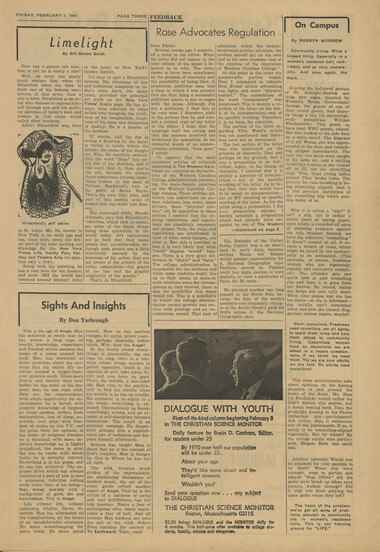

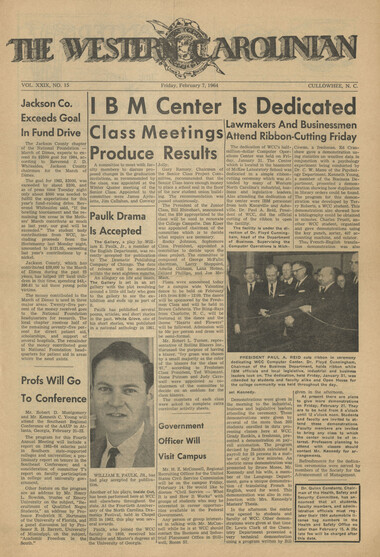
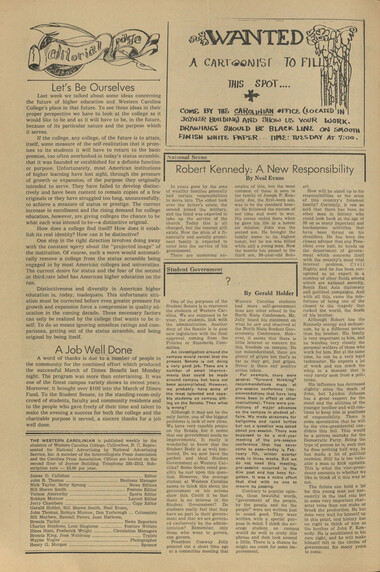

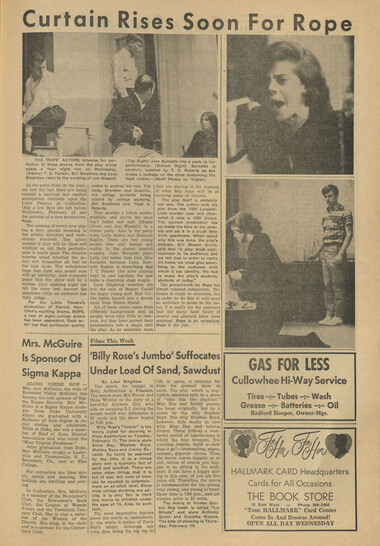

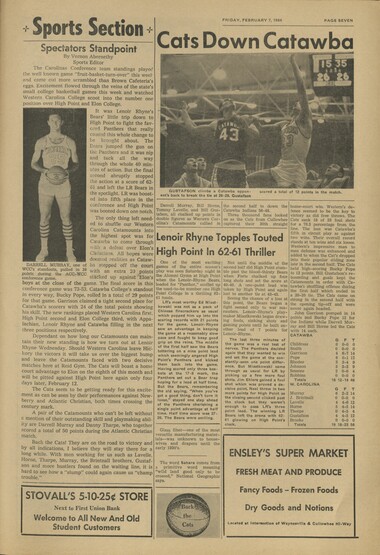
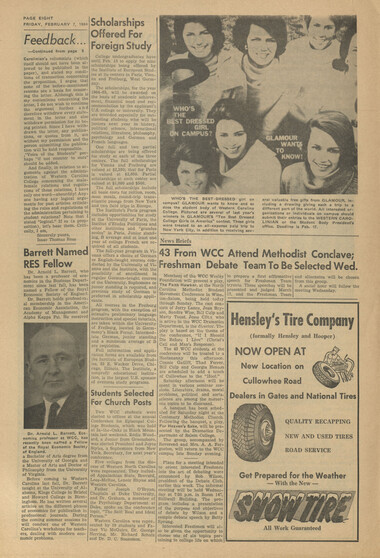
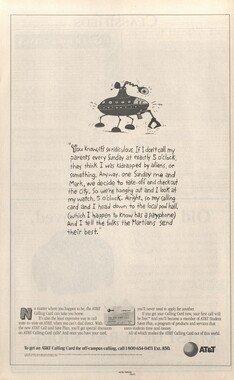
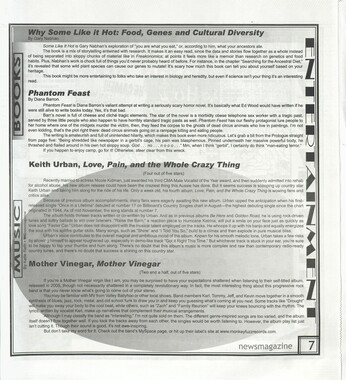
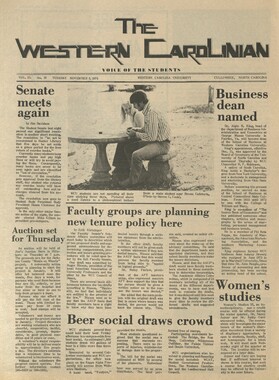
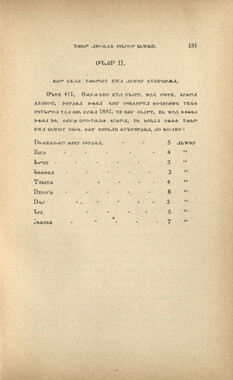
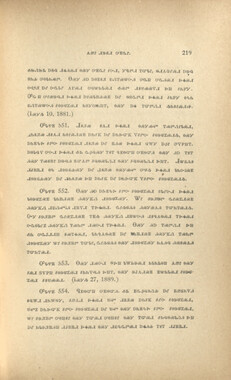
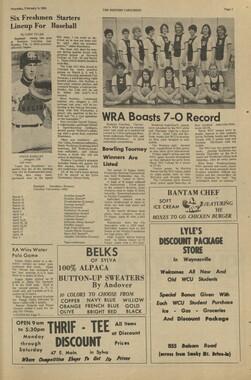
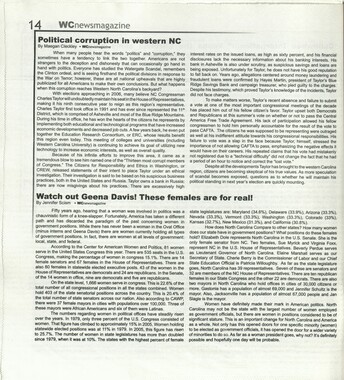
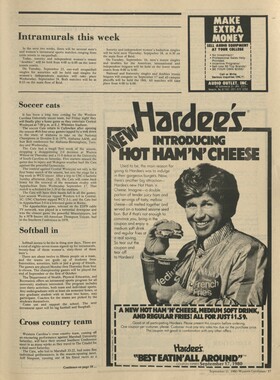
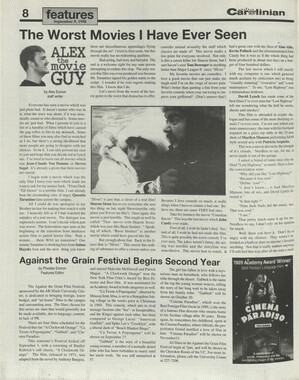
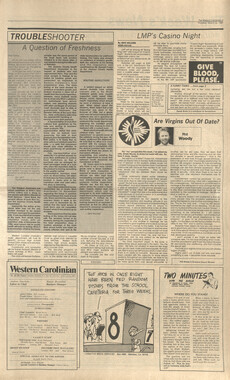
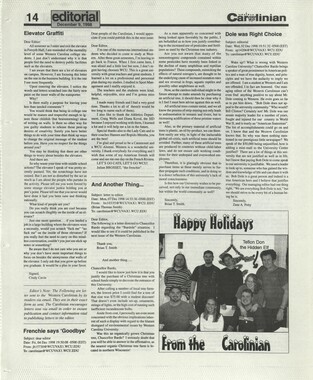
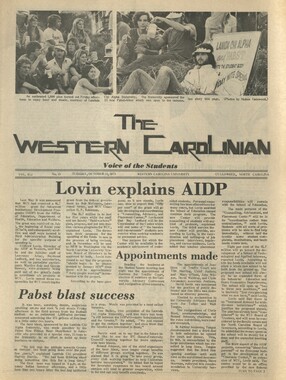
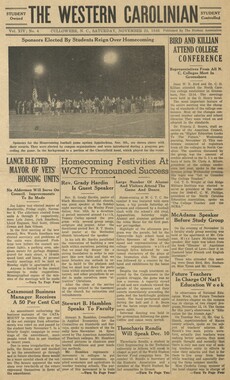
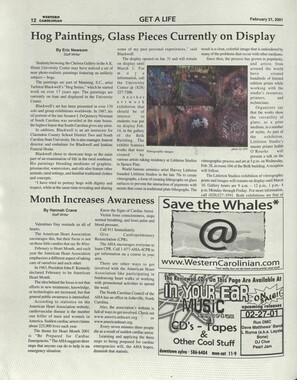
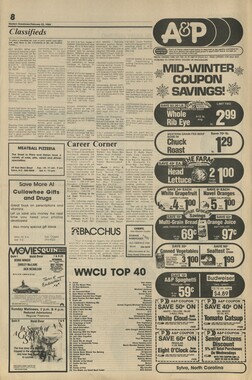

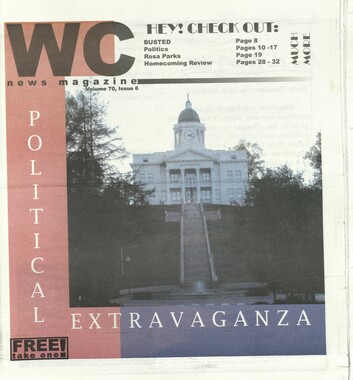
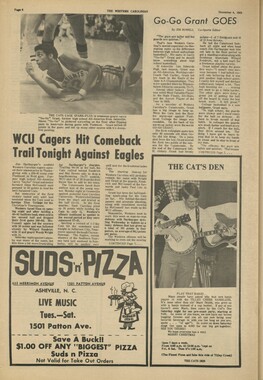
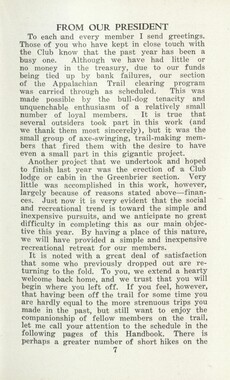
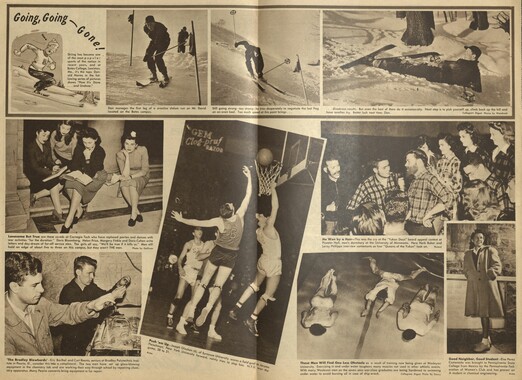
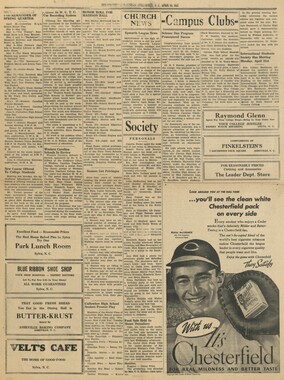
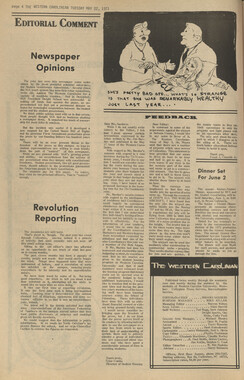
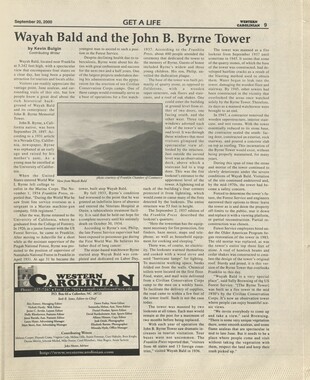
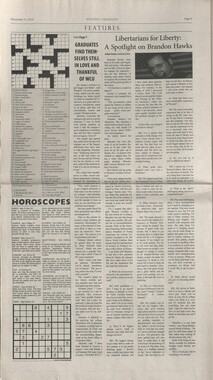
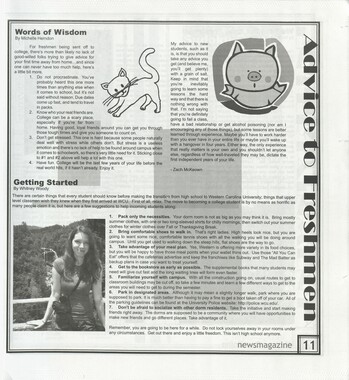
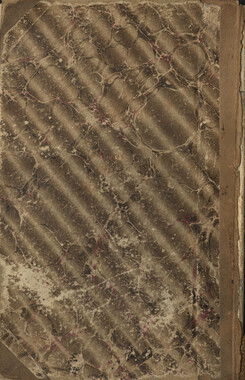
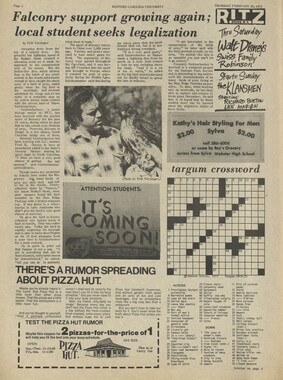
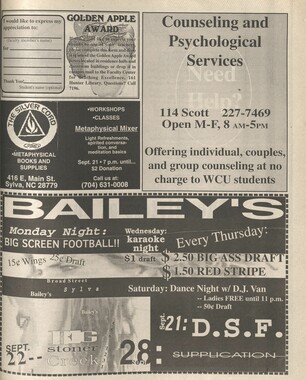

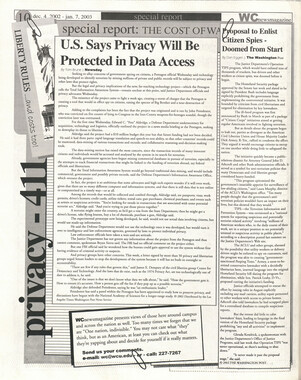

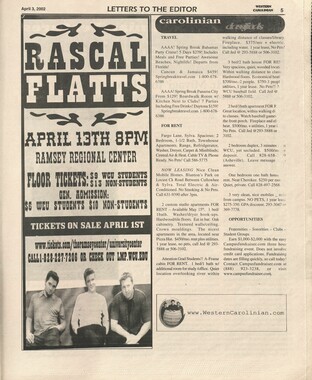
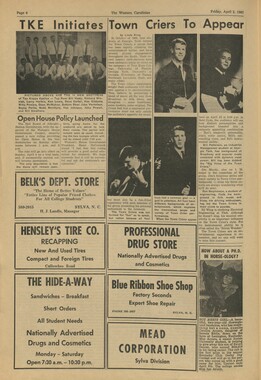
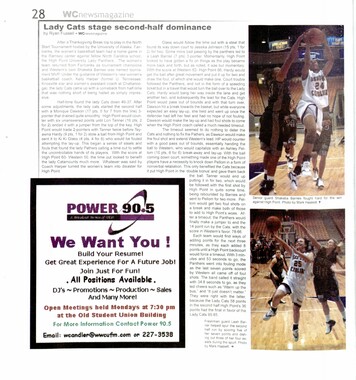


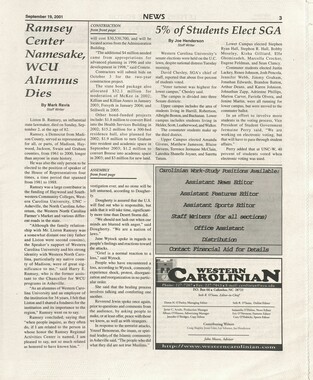

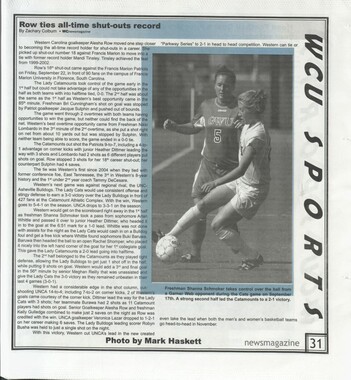


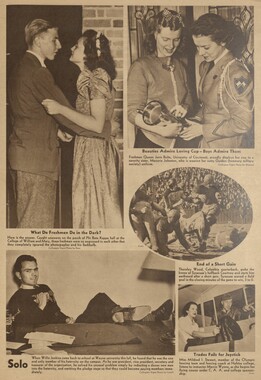

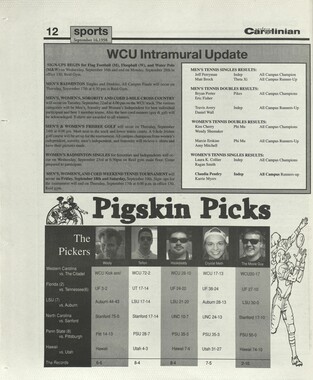
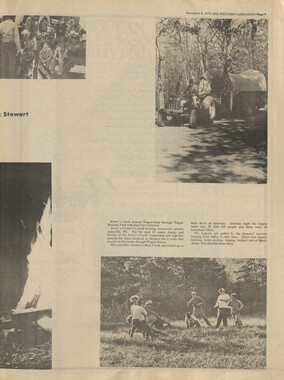
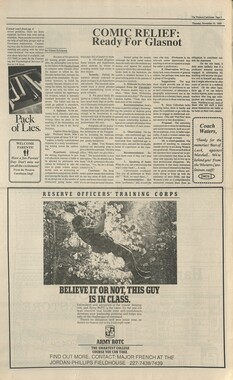
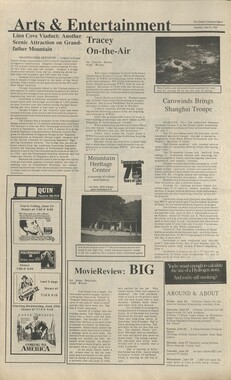

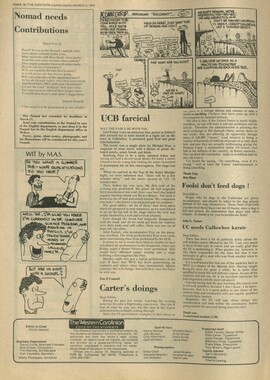
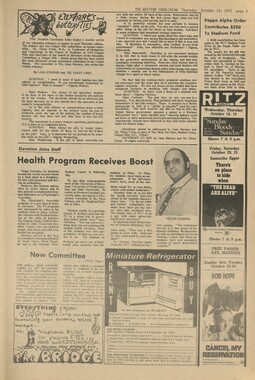
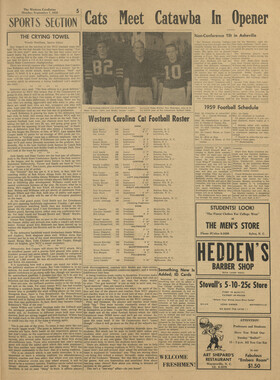


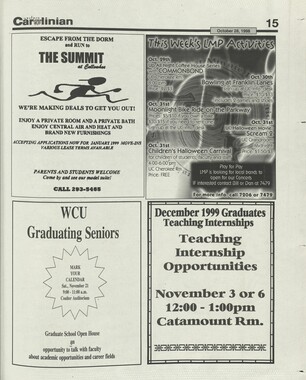

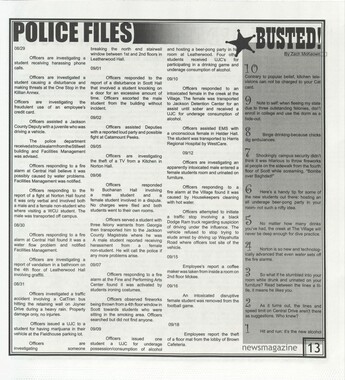
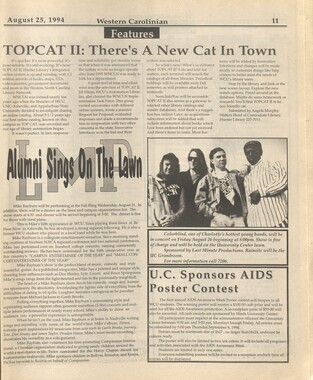
![hl_westerncarolinian_2008-09-26[10-27]_vol74_no03[04]_15.jpg](/media/w400h300/wcu_publications/hl_westerncarolinian_2008-09-26[10-27]_vol74_no03[04]_15.jpg)
